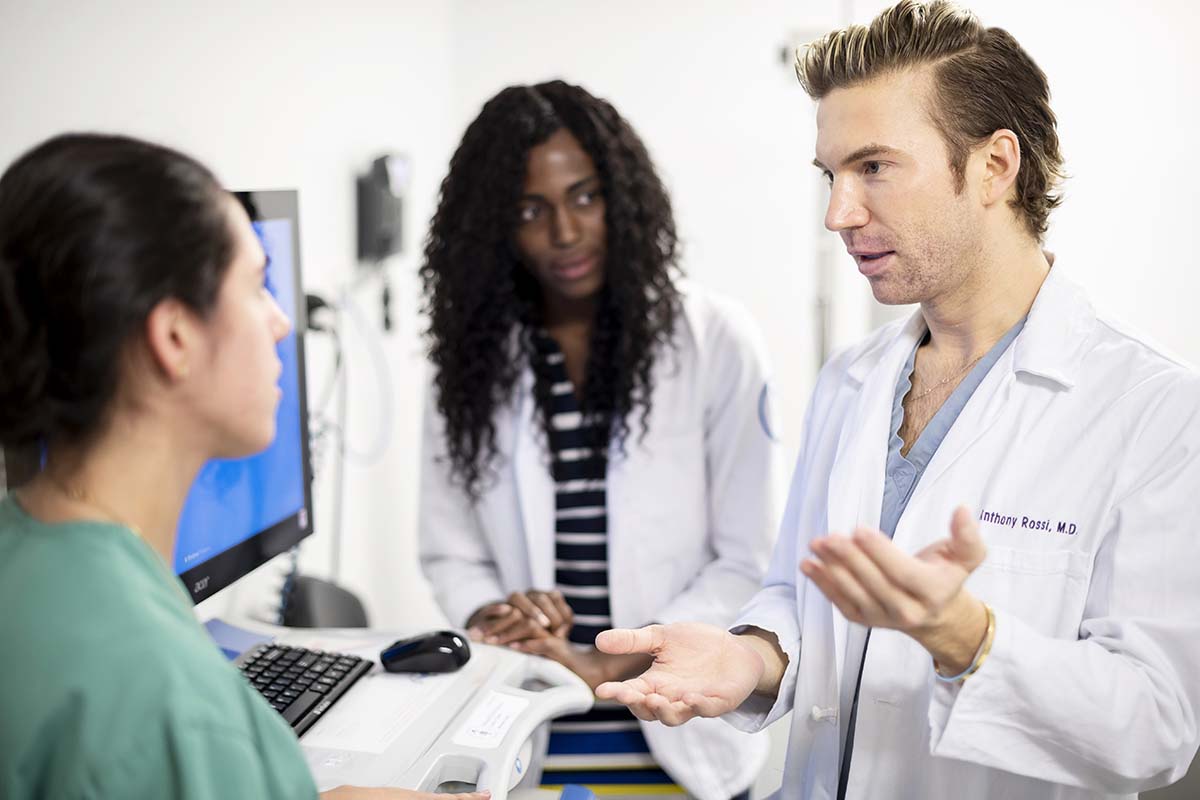
At Memorial Sloan Kettering, our basal cell carcinoma doctors and experts are able to easily and successfully treat basal cell carcinomas with currently available treatments. It’s a highly curable cancer with both surgical and nonsurgical therapies, especially if treated early.
Which treatment is used depends on:
- where the tumor is
- how big the tumor is
- how deep the tumor is
- your general health
- your medical history
- whether the tumor has been treated before
There are many treatment options are available for basal cell carcinoma. Most can be easily done in your doctor’s office. They include:
Cryotherapy
Cryotherapy is a nonsurgical treatment for basal cell carcinoma. Your doctor applies liquid nitrogen to the tumor, freezing the abnormal tissue. The frozen skin then sloughs off (falls away) as the skin underneath heals.
Curettage and Electrodesiccation
A very common treatment for basal cell carcinoma is curettage and electrodesiccation. It’s most effective for low-risk tumors found on your trunk and limbs.
First, the area is numbed with a local anesthetic. Once the freezing has taken effect, your surgeon uses a curette (a semisharp instrument with a spoon-shaped edge) to scrape away the cancerous tissue. Once that is done, your doctor uses an electric needle to control the bleeding. This technique also destroys any cancer cells that may remain around the edge of the tumor. The wound usually heals within a few weeks.
Laser Surgery
With laser surgery, the tumor is vaporized with a highly focused light beam. Laser surgery only kills tumor cells on the surface of the skin and doesn’t go deeper, so its use is limited and close follow-up is essential.
Mohs Surgery
MSK physicians who treat basal cell carcinoma and other skin cancers include dermatologists, Mohs surgeons, radiation oncologists, and medical oncologists.
For tumors with a high risk of recurrence, we may perform a highly specialized technique called Mohs surgery. In this procedure, your surgeon removes the tumor tissue layer by layer, mapping and freezing each layer. Each layer is examined under a microscope for tumor cells before proceeding to the next. This is a precise, complex, and time-consuming process, but Mohs surgery makes sure that the whole tumor is removed. It also limits the amount of scarring by keeping as much normal skin as possible.
Mohs surgery has the highest cure rate of all therapies and is especially effective for high-risk basal cell carcinomas, such as large tumors, tumors that have recurred after other treatments, and tumors in areas such as the face, where we want to preserve as much normal skin as possible.
Surgery
High-risk basal cell carcinoma is usually removed by surgery, which can be done anywhere on your body. To perform the procedure, called standard surgical excision or removal, your surgeon injects a local (area) anesthetic and then removes the tumor from your skin. A portion of tissue around the tumor (a safety margin) is also taken off to make sure that all the cancer cells have been removed. The wound is then closed with sutures (stitches).
Surgery is most effective for tumors with well-defined borders. One advantage to this procedure is that the tissue can be sent to a laboratory so a pathologist (a specialist who examines the tissue for signs of cancer) can verify if the whole tumor has been removed.
Learn about our skin cancer program for advanced skin cancers.
Radiation Therapy
Radiation therapy, a treatment that involves x-rays or high-energy particles, can be useful for tumors in areas that are hard to treat surgically or for patients who are at a higher risk of having complications from surgery. Radiation is also sometimes used after surgery to destroy any cancerous cells that remain, or to treat tumors with a higher risk of recurrence.
Radiation is usually delivered in small doses over a period of three to four weeks to avoid burning the skin and to improve the cosmetic outcome.
Topical Chemotherapy

Most people think of chemotherapy as something they get by IV or take as pills. But topical chemotherapy treatments also exist. These are creams and lotions that contain chemotherapy drugs. Topical chemotherapy targets damaged skin without touching the surrounding normal tissue. However, because the cancerous tissue is not removed, it can’t be tested.
Cure rates are typically lower with topical chemotherapy than with other therapies, so these treatments are usually reserved for small low-risk lesions. A drawback to topical chemotherapy is that it may not go through all the layers of the skin, so careful follow-up is essential after treatment.
One topical chemotherapy we offer is fluorouracil. It’s available in a lotion form, and you apply it at home for three to six weeks. Another topical treatment is imiquimod, a lotion that causes immune cells to attack the abnormal tissue.
Reconstruction
Any form of surgery may leave a scar, and some scars are more noticeable than others. If removing a basal cell carcinoma leaves behind a wound that is too big to close with simple sutures (stitches), your surgeon may do reconstructive surgery, such as skin grafts and flaps. These techniques can help heal the skin and restore its appearance.
Follow-up Care
Even after successful treatment, some basal cell carcinomas can come back. Also, people who have had one skin cancer are at a higher than average risk for developing new skin cancers of all types.
If you’ve been treated for basal cell carcinoma, you should see your doctor immediately if you find a growth, bump, or spot or if you notice any changes in your skin that could mean the disease has returned. You must make sure to protect yourself from the sun as well.
We’re available 24 hours a day, 7 days a week



